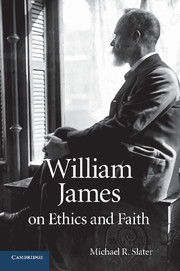Book contents
- Frontmatter
- Contents
- Acknowledgements
- Introduction: a practical faith
- PART I PRACTICAL FAITH AND THE WILL TO BELIEVE
- 1 The will and the right to believe
- 2 James's Wager and the right to believe
- PART II TWO MORAL ARGUMENTS FOR RELIGIOUS FAITH
- PART III PIECEMEAL SUPERNATURALISM AND PRACTICAL NEEDS
- Epilogue
- Bibliography
- Index
1 - The will and the right to believe
Published online by Cambridge University Press: 03 February 2010
- Frontmatter
- Contents
- Acknowledgements
- Introduction: a practical faith
- PART I PRACTICAL FAITH AND THE WILL TO BELIEVE
- 1 The will and the right to believe
- 2 James's Wager and the right to believe
- PART II TWO MORAL ARGUMENTS FOR RELIGIOUS FAITH
- PART III PIECEMEAL SUPERNATURALISM AND PRACTICAL NEEDS
- Epilogue
- Bibliography
- Index
Summary
With the possible exception of his pragmatism, none of James's philosophical doctrines is better known or more characteristic of his thought than the will to believe. In the most general terms, this doctrine maintains that we can be justified under certain conditions in holding beliefs for which there is insufficient evidence, but which are of fundamental importance for how we live and how we make sense of the world. By far the most important of these – and the ones that James was most concerned to defend – are religious and metaphysical beliefs, including the belief in an objective moral order (WB, 27–33; 80–89). James argues not only that we can be justified in holding evidentially unsupported beliefs under certain conditions, but also that it is sometimes difficult, if not impossible, in practice to avoid doing so, and that making a decision may, in turn, be the only way to determine whether such beliefs are ultimately true or false (WB, 27–33; 80–89). To put off making a decision about whether God exists or whether there is an objective moral order, for example, is practically to decide in favor of unbelief – that is, it involves a choice to live one's life as if God did not exist or there were no such order (WB, 20, 33; 50–51; 84–89). In such cases, James argues, we not only do decide as our passions and wills incline us, but also have no objective reason to judge such decisions as epistemically unlawful.
- Type
- Chapter
- Information
- William James on Ethics and Faith , pp. 19 - 47Publisher: Cambridge University PressPrint publication year: 2009



